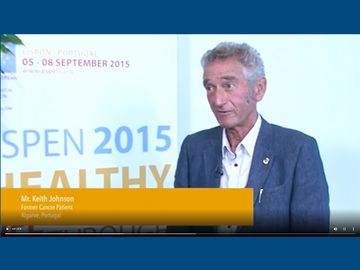Implementation of Europe's Beating Cancer Plan
Integrate nutritional care to sustain the quality of life of cancer patients
About malnutrition and cancer
Malnutrition occurs when cancer patients are unable to meet their nutritional needs via the normal diet due to the disease and/or side-effects of medical treatments, such as chemotherapy.
Patients with cancer are more likely to develop malnutrition; level of risk depends on cancer type, stage of the disease or the patients’ age.
1 in 3 cancer patients are likely malnourished1.
Cancer-related malnutrition costs ~ €17 billion a year in the EU2.
Left untreated, malnutrition is a serious condition that affects the survival and the quality of life of cancer patients.
As the Europe’s Beating Cancer Plan moves into its implementation phase, MNI calls upon the EU Institutions and Member States to establish nutritional support as part of optimal and patient-centric cancer care by implementing the following recommendations:
1. Screening regularly for malnutrition.
Include a systematic, standardised and harmonised malnutrition screening practice in Europe’s Beating Cancer Plan.
Stronger EU guidance is required to address persistent inconsistencies in malnutrition screening across Europe. However, malnutrition screening is not addressed in Europe’s Beating Cancer Plan.
Screening a patient for malnutrition takes only a few minutes. Healthcare professionals can be trained to perform malnutrition screening – using tools3 validated by scientific societies - in a short period of time.
2. Educate the healthcare workforce about nutritional care.
Nutrition training should be extended to undergraduate medical students, general practitioners and oncology nurses.
Healthcare professionals and cancer patients are often unaware of malnutrition and the importance of nutritional care during cancer treatment. Adherence to existing nutritional guidelines is currently inconsistent between EU Member States.
MNI appreciates that the Plan includes actions to educate the healthcare workforce, and we believe that nutritional care as part of disease management should be a core element of healthcare professionals’ training curricula.
To implement this action consistently across the EU, it is necessary to establish harmonised minimum standards for training on nutritional care, building on the work of the clinical nutrition societies.
3. Make multidisciplinary teams an integral part of cancer management.
The inter-specialty training programme should include dieticians and nutritionists in order to develop a truly multidisciplinary cancer workforce. The inclusion of nutrition specialists in these multidisciplinary teams should be mandated in national cancer plans.
Multidisciplinary teams are vital in order to deliver optimal care for cancer patients.
Unfortunately, the reality across the EU is different, with dieticians and/or nutritionists not consistently included in cancer care teams.
Ensuring nutrition specialists are part of such teams will integrate nutritional care into cancer patient pathways, enabling improve responses to treatment. This nutritional assistance will also help cancer patients continue their treatment, reducing the interruption rate.
By implementing these recommendations, Europe’s Beating Cancer Plan can establish nutritional support as part of optimal cancer care – leading to fewer complications, improved use of healthcare resources, and better outcomes for cancer patients.
Learn more
Infographic “Cancer care: why nutrition matters” (2020)
Infographic “Malnutrition – A condition that affects 33 million people in Europe” (2020)
MNI contribution to the Roadmap of Europe's Beating Cancer Plan (February 2020)
European Commission - EU policy on cancer
References
1. Better care through better nutrition: value and effects of medical nutrition - A summary of the evidence base”
2. Freijer, Karen et al. The economic costs of disease related malnutrition. Clinical Nutrition, Volume 32, Issue 1, 136 – 141
3. Arends et al. Cancer cachexia in adult patients: ESMO Clinical Practice Guidelines. ESMO Open 2021
Malnutrition in Cancer
Malnutrition in cancer patients leads to complications, poorer quality life, and increasing costs to healthcare systems
Patients with cancer are more likely to develop malnutrition; level of risk is dependent on cancer type, stage or the patients’ age. It has been reported up to 70% of cancer patients can become malnourished. Patients with gastro-intestinal cancers, at more advanced cancer stages or older patients are more likely to develop malnutrition due to the disease.
Malnutrition results in an increased burden to healthcare resources, with an estimated cost of €17 billion/year in the EU.
Nutritional care should be an integral part of cancer care across Europe
Cancer related malnutrition affects patients and adds burden to healthcare systems, yet it is not sufficiently addressed.
Cancer treatment typically targets cancerous cells and tumours, while cancer related symptoms and complications are not routinely addressed and integrated in the care pathway, despite their significant impact on patients’ outcomes.
A recent World Health Organization (WHO) report notes that appropriate nutritional care helps cancer patients cope better with their illness and treatment
MNI calls to improve cancer care through medical nutrition in Europe
MNI calls for a transformation of current oncology care models as follows:
- Healthcare professionals, patient advocated and cancer patients should be better informed and educated on malnutrition & nutritional care during cancer treatment.
- Therapeutic approaches should be delivered by a multidisciplinary team, including a dietitian or a nutritionist.
- Malnutrition screening should be mandatory at diagnosis and monitored throughout the treatment.
- Existing clinical guidelines on nutritional care for cancer patients should be implemented in routine treatment protocols, including timely use of medical nutrition.
- Patients should have equal access to medical nutrition.
Call for Action - Healthcare experts call to improve the nutritional care of cancer patients
WHO report on cancer: setting priorities, investing wisely and providing care for all
Resources
Value of Medical Nutrition in Oncology - Evidence Dossier 2020
Infographic "Cancer care: why nutrition matters"
Christine - cancer patient on home parenteral nutrition
Integrating nutritional therapy in cancer treatment
Joint Statement - Making cancer-related complications and comorbidities an EU health priority
A joint statement by several European and national associations - supported by MNI - refers to malnutrition as one of the burden of cancer-related complications and comorbidities:
Malnutrition (undernutrition): Many cancer patients have a normal weight or are even overweight or obese, but still have a significant weight loss and underlying hidden sarcopenia (i.e. characteristics of malnutrition) which is responsible for the poor outcomes related to malnutrition. It is estimated that the deaths of 10-20% of patients with cancer can be attributed to malnutrition rather than to the malignancy itself. Thus, nutrition is an important aspect of multimodal cancer care. Yet, recent studies in European hospitals found that only 30%-60% of patients with cancer who were at risk of malnutrition actually received nutritional support (i.e., oral nutritional supplements, enteral and/or parenteral nutrition).
Download the Joint Statement from the website of the European Cancer Patients Coalition (ECPC)



